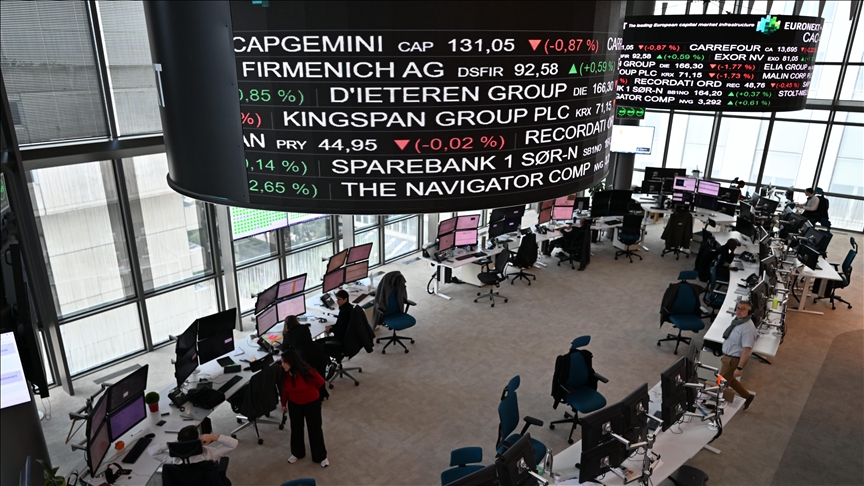European stocks end Tuesday lower as Israel-Iran conflict continues
Stoxx 600 down 0.85%, Britain's FTSE falls 0.46%, Germany's DAX slips 1.12%, France's CAC off 0.76%

ISTANBUL
European stock markets closed the second trading day of the week with losses as investors continued to focus on the ongoing Iran-Israel conflict, which began on Friday.
The pan-European Stoxx Europe 600 index fell 0.85% or 4.65 points to close at 542.26.
Germany's DAX 40 fell 1.12% to 23,434.65 points, while the UK's FTSE 100 index lost 0.46% to 8,834.03.
France's CAC 40 index decreased 0.76% to 7,683.73 points and the FTSE MIB 30 index in Italy was off 1.36% to 39,387.22.
Regional tensions have escalated in the Middle East since Friday, when Israel launched airstrikes on multiple sites across Iran, including military and nuclear facilities, prompting Tehran to launch retaliatory strikes.
Since then, Israeli authorities said at least 24 people have been killed and hundreds injured in Iranian missile attacks. Iran said at least 224 people have been killed and more than 1,000 others wounded in the Israeli assault.
Global markets were mixed amid expectations that the ongoing geopolitical tensions in the Middle East may spread over a long period of time and energy supply concerns, which were also reflected in European stock markets.
Although Iran did not close the Strait of Hormuz contrary to expectations and oil prices partially retreated after the clashes that started with Israeli attacks on Iran, the conditions for energy prices remain fragile.
In addition to geopolitical developments, investors would focus on the US Federal Reserve's (Fed) decisions to be announced tomorrow at the Federal Open Market Committee (FOMC) meeting and the Bank of England's policy rate decision.
Markets expect that both banks will leave the policy rate unchanged.
On the other hand, the UK and the US announced a trade agreement on Tuesday, with the UK securing a significant tariff reduction.
Under the new terms, UK car exports to the US will face a reduced tariff of 10%, down sharply from the previous rate of 27.5%.
The aerospace sector will enjoy even greater relief, with tariffs on British exports such as aircraft engines and parts eliminated entirely.
However, the agreement has faced criticism for failing to lift tariffs on UK steel and aluminum exports.
UK steel exports to the US will continue to face a 25% levy, down from a global 50% rate imposed by the Donald Trump administration, but still putting British producers at a disadvantage.
Anadolu Agency website contains only a portion of the news stories offered to subscribers in the AA News Broadcasting System (HAS), and in summarized form. Please contact us for subscription options.







